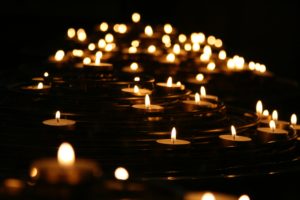 by Fr. Baumann. The practice of keeping a memorial day for the dead did not begin with Christianity; such a commemoration was prevalent in pagan antiquity. However, the Church has encouraged prayers for the dead from the earliest centuries as an act of Christian charity. As early as the second century, Christians commemorated the anniversary of the dead, especially of the martyrs. Our current observance of a single day for the dead dates to the seventh century and it is known that St. Isadore of Seville encouraged it. The monks of Cluny set the date as November 2nd, the day following the feast of All Saints, and in the fourteenth century Rome extended that practice to the universal Church.
by Fr. Baumann. The practice of keeping a memorial day for the dead did not begin with Christianity; such a commemoration was prevalent in pagan antiquity. However, the Church has encouraged prayers for the dead from the earliest centuries as an act of Christian charity. As early as the second century, Christians commemorated the anniversary of the dead, especially of the martyrs. Our current observance of a single day for the dead dates to the seventh century and it is known that St. Isadore of Seville encouraged it. The monks of Cluny set the date as November 2nd, the day following the feast of All Saints, and in the fourteenth century Rome extended that practice to the universal Church.
The custom of offering three masses on this day began in Spain in the fifteenth century. It was Pope Benedict XV who extended this privilege to the entire Church. We had three masses in our church last Monday, each with a different set of presidential prayers – i.e. the Collect/Opening, the Offertory, and the Closing Prayer.
The tone of All Souls Day is subdued and recalls Christ’s suffering and death, which gives meaning to the deaths of faithful Christians. As we have died with Him, so also shall we share in His resurrection.
The Entrance Antiphon for one of three sets of prayers for the Masses on All Souls quotes two verses from the letters of St. Paul: “Just as Jesus died and rose again, so will the Father bring with Him those who have died in Jesus. Just as in Adam all men die, so in Christ all will be made alive.” (1 Thess. 4:14; 1 Cor. 15:22.)
Belief in the resurrection of Jesus, and belief in our own resurrection should convince us to take life seriously. Death is not something that we as Christians face with fear; it is not a threat to existence. If we understand it as the necessary prelude to resurrection, then it will help us to determine how to live. We will then look upon our time in this life as a series of opportunities for believing, hoping, loving, and growing. Such opportunities are unique, are gifts from God, and will not be repeated. So we should not miss them!
Our destiny, has been designed by the same Father who raised up Jesus from death. He wants us to join his Son in glory where we will live with more intensity than ever before, and forever. Like last Sunday’s Solemnity of All Saints, All Souls is a feast of God’s triumph, in Jesus, over sin and death, and “a promise that we will one day enjoy the vision of God’s glory in the kingdom where hope is firm for all who love and rest is sure for all who serve.” (Sr. Kathleen Hughes, RSCJ, in Scripture In Church, v. 15, n.60, p.403).
Perhaps we will be more conscious of the Communion of Saints, which the Church teaches takes place at every Mass, where our deceased loved ones join the Lord and the visible priest in the sanctuary. We are much closer to them at Mass than at any cemetery. They are always with the Lord, and He is with us as the true Celebrant of every mass.
When we pray for them, we experience a wonderful communion of help and of companionship. They pray for us, and look forward to our reunion one day. We can be aware too that we are also making our way to fullness of life and happiness in Jesus. That life is the gift that He has won for us.
Each year, as we celebrate the Commemoration of the Holy Souls, may the God of all consolation “bless us with faith in the resurrection of his Son, and with the hope of rising to new life.” And as the closing prayer of mass for All Souls reminds us, “To us who are alive may he grant forgiveness, and to all who have died a place of light, happiness, and peace.” (Cf. Solemn Blessings).
